What is Stock Trade?
Auxiliary business sectors can be much of the time called stock trades where existing offer proprietors have the potential chance to execute with the purchasers. In any case, one ought to comprehend that organizations recorded on the offer market don’t sell or purchase their own portions. Hence, when financial backers purchase stocks, they are buying it from a current investor and not the organization. Moreover, financial backers offer their portions to one more financial backer rather than the organization. There are six notable stock trades among which Bombay Stock Trade and Public Stock Trade are the most well-known ones.
BSE (Bombay Stock Trade)
Established in the year 1875 by Premchand Roychand, BSE is the most seasoned Asian stock trade. It just comprised of 22 stockbrokers in beginning days who would actually meet to do their exchanging exercises. In 1874, BSE relocated to Dalal Street, where it gained prominence. The Sensex was introduced in 1986 as the first-ever stock index, comprising thirty top trading companies across ten sectors.
NSE (National Stock Exchange)
Laid out in 1992, NSE was the principal electronic and totally robotized exchanging framework in India that effectively supplanted the conventional paper-based settlement framework and offered a similarly simple and bother-free exchanging office. It is the greatest Indian stock trade corresponding to showcase capitalization.

How are Stock Costs Set?
The load of an organization is first recorded by means of an Initial public offering (First sale of stock) where a venture bank decides the anticipated and current well-being and execution of an organization to recognize the Initial public offering’s incentive for the business. Comparing a similar company’s IPO or evaluating the company’s current net worth alone cannot entirely determine the IPO’s success. At the point when a privately owned business changes to the public, this is the essential variable that decides the organization’s underlying offer cost.
Notwithstanding, with regards to assurance of costs consistently, there are sure factors that can be thought about. Some of them are as per the following.
- Request and Supply While the exchanging hours start, the interest and supply of offers to a great extent decide their costs. An organization that offers a capability of long-haul profit will draw in additional purchasers which, thus, expands its portion costs. In opposition to that, the unfortunate viewpoint of an organization could draw in purchasers who need to buy stocks at a less expensive rate, hence, diminishing the cost. Stock costs increment when the quantity of purchasers is more than merchants and the costs fall when the quantity of dealers is more than purchasers. Delayed downtrends structure a bear market while a drawn-out downtrend makes a buyer market.
- Group Impulse It alludes to the propensity of individuals to copy the exchanging exercises of the greater part bunch.For example, when many individuals buy a specific stock to push its price higher, others will also follow this direction, assuming that the earlier group knows something they do not.
-
Market News
These incorporate financial changes, material organization occasions, political occasions, and procuring reports that can cause brief or abrupt changes in stock costs. Nonetheless, every piece of information can’t possibly influence a wide range of stocks. For example, news concerning the organizations having a place in the oil and gas industry will proceed to affect the stock costs of the said organizations. Exchanging Methodology of the Securities Exchange With the coming of web-based exchanging offices, anybody can exchange nowadays by following a couple of straightforward advances.
The exchange systems are expressed underneath:
-
Choosing a representative:
Investors can trade stocks in the share market only through brokers registered by SEBI as members of the Indian Stock Exchange. These merchants can be corporate bodies, association firms, or people. Thus, the primary thing that a financial backer requires is to find a specialist to complete exchanging for their benefit.
-
Opening a demat account:
Indian residents are expected to open a dematerialized account with a store member. for example, stock representatives or banks for the protections recorded in the stock trade. A safe is an association or foundation that holds protections like common assets, bonds, debentures, and offers. In India, the Focal Store Administrations Restricted and the Public Protections Safe Restricted are two vaults. The safe just associates with financial backers by means of the store members who illuminate the financial backers regarding the possessions’ status routinely.
-
Submitting and execution of request:
Investors can submit orders via depository members or brokers through Email, call, etc. They specify security details for trading. The broker executes the order, providing a contract note thereafter.
